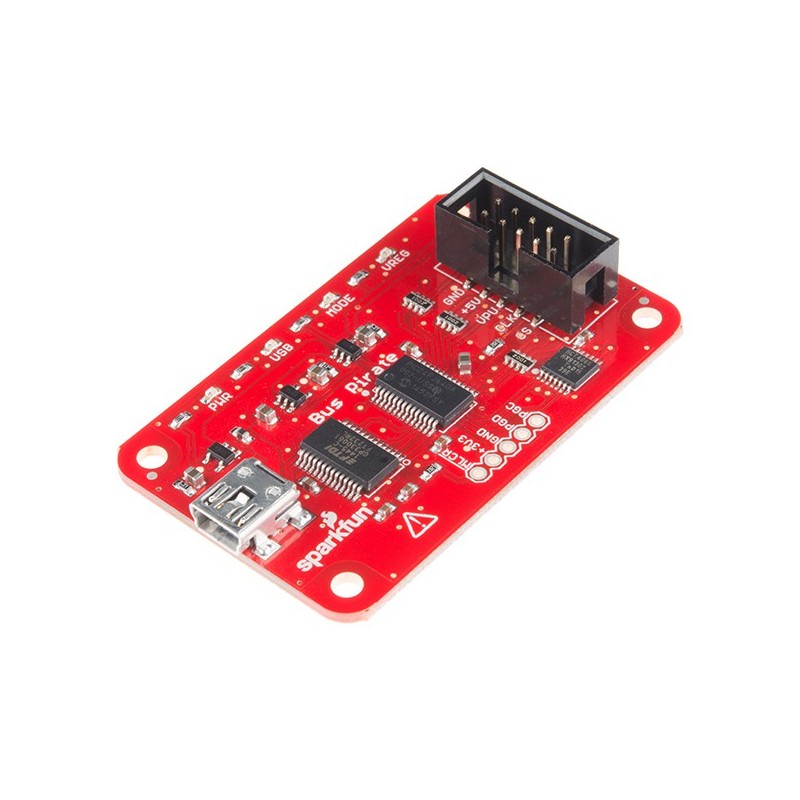






zł169.92 tax excl.
Troubleshooting tool that communicates between a PC and any embedded device over 1-,2-,3-wire, UART, I2C, SPI, and HD44780 LCD protocols - all at voltages from 0-5.5VDC. Eliminates a ton of early prototyping effort when working with new or unknown chips. TOL-12942
The Bus Pirate v3.6a, created by Ian Lesnet, is a troubleshooting tool that communicates between a PC and any embedded device over 1-wire, 2-wire, 3-wire, UART, I2C, SPI, and HD44780 LCD protocols - all at voltages from 0-5.5VDC. This product eliminates a ton of early prototyping effort when working with new or unknown chips.
Working with the Bus Pirate is simple and effective - type commands into a terminal on your computer, those commands are interpreted by the Bus Pirate and sent via the proper protocol. The Pirate will also interpret data sent from your embedded device back to your computer terminal. A big bonus is the bootloader installed on the PIC, which allows you to easily update the firmware and change the functionality of the board.
The main components of the Bus Pirate are the PIC24FJ64 processor and a FT232RL USB-to-Serial chip. A Mini-B USB connector that has also been populated on the board, provides the power to the Bus Pirate and allows you to interact with via your PC. The major difference in this version of the Bus Pirate comes from the shrouded 0.1" pitch 2x5 pin header, which has been flipped around to help standardize this board. Additionally every pin on this header has been labeled, eliminating the need for a separate I/O pin description document like with earlier versions.
Manufacturer BTC Korporacja sp. z o. o. Lwowska 5 05-120 Legionowo Poland sprzedaz@kamami.pl 22 767 36 20
Responsible person BTC Korporacja sp. z o. o. Lwowska 5 05-120 Legionowo Poland sprzedaz@kamami.pl 22 767 36 20
Cable with USB plugs type A and mini-USB type B, cable with a length of 1.8 m
No product available!
This is an interface cable for the Bus Pirate, designed to connect to its 2x5 I/O header. The cable’s connector is composed of two rows of five 0.1" spaced pins. CAB-09556
Troubleshooting tool that communicates between a PC and any embedded device over 1-,2-,3-wire, UART, I2C, SPI, and HD44780 LCD protocols - all at voltages from 0-5.5VDC. Eliminates a ton of early prototyping effort when working with new or unknown chips. TOL-12942
No product available!
Acrylic housing designed for the MZ OpenScope device (410-324). It helps protect the device from damage to everyday use or during travel. Digilent 240-133
16-channel logic analyzer with a maximum sampling frequency of 100 MHz. It can decode data under most popular communication protocols. Works with Windows systems. LA1010
High resolution data logger, equipped with eight analog channels, two power sources, function generator, eight digital I/O and wireless connection. Digilent 471-028
No product available!
High resolution data logger, equipped with eight analog channels, two power sources, function generator, eight digital I/O and wireless connection. Kit with accessory. Digilent 471-028
No product available!
16-channel logic analyzer with a sampling frequency of 500 MHz. It can decode data under most popular communication protocols. Works with Windows systems. LA5016
16-channel logic analyzer with a sampling frequency of 200 MHz. It can decode data under most popular communication protocols. Works with Windows systems. Seeed Studio 109990065
No product available!
Compact, 4-channel logic analyzer with a sampling frequency of 100 MHz with a 2.8 "LCD display. It is used to analyze the logic relationships of digital systems. Seeed Studio 109990365
32-channel logic analyzer with a sampling frequency of 500 MHz. It can decode data under most popular communication protocols. Works with Windows, Linux and Mac OS systems. LA5032
A multifunctional device (computer attachment) that combines a 2-channel digital oscilloscope and a 16-channel logic analyzer. Hantek6022BL
MCC USB-DIO32HS is a digital I/O module with 32 channels, clocking up to 8 MS/s, pattern detection, and USB support. Digilent 6069-410-033
No product available!

Troubleshooting tool that communicates between a PC and any embedded device over 1-,2-,3-wire, UART, I2C, SPI, and HD44780 LCD protocols - all at voltages from 0-5.5VDC. Eliminates a ton of early prototyping effort when working with new or unknown chips. TOL-12942
